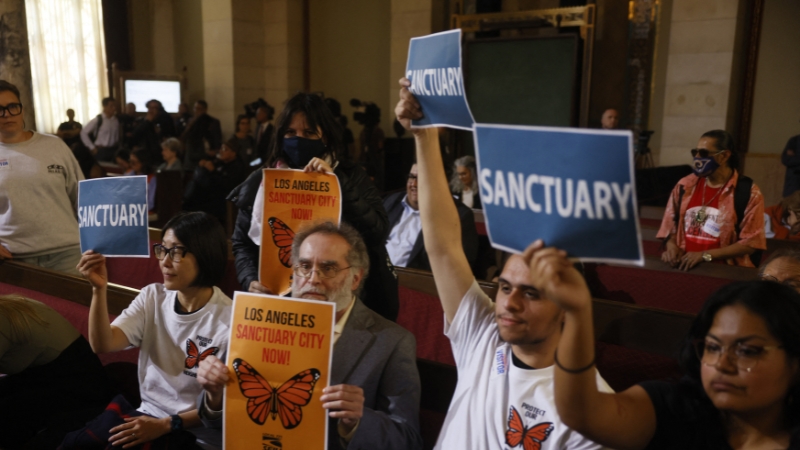 Image Credit: ETIENNE LAURENT / Contributor / Getty Images
Image Credit: ETIENNE LAURENT / Contributor / Getty Images A federal judge has massively expanded the scope of a previous order preventing the Trump administration from denying federal funding to so-called “sanctuary” jurisdictions.
The new order will stop President Trump from withholding funding from 30 more cities and counties across the US, including Los Angeles, Boston, Denver, Baltimore, Chicago and Columbus.
All of these jurisdictions have local statutes that limit cooperation with federal immigration agents.
The original order, issued by Judge William Orrick in April, concerned 16 cities and counties, most of which were concentrated in California but also included Seattle, Portland and Minneapolis.
The original order was in response to a lawsuit that alleged the withholding of federal funding would prevent the cities and counties in question from going ahead with a variety of capital projects and would also lead to the scaling-back of public services.
“The new plaintiffs have each alleged similar reliance on federal funding as the cities and counties and filed declarations showing similar harms to community health, welfare and social services and to their budgetary processes that depend on the regularly authorized grants of federal funding for a variety of critical needs,” Judge Orrick wrote.
The New York Times notes that, by extending his original order, Judge Orrick has effectively got around the Supreme Court’s June decision to block nationwide injunctions made by lower-court judges.
“By moving to include more than 30 additional cities and counties in the earlier decision, the local governments suing to halt the president’s attacks on sanctuary cities effectively brought about a comparable result,” the Times states.
There are around 220 sanctuary jurisdictions in the US today.
Sanctuary jurisdictions, which refuse to cooperate with federal immigration operations, were a major target during President Trump’s first term. He signed an executive order to withdraw federal grants from jurisdictions based on their immigration policies. In 2018, that order was blocked, before the block was overturned in 2020.
During the 2024 election campaign, President Trump promised that he would abolish sanctuary jurisdictions if elected.
Attorney General Pam Bondi targeted these jurisdictions immediately upon her confirmation, ordering federal funding to them to be paused and a full investigation of all funding agreements these jurisdictions have with NGOs that offer assistance to illegal aliens. She has also launched a number of lawsuits against sanctuary cities, including Chicago and New York.
At the end of July, a Biden judge tossed a lawsuit against Illinois’s sanctuary policies.
In her ruling, Biden-appointed Judge Lindsay C. Jenkins said the Tenth Amendment protected local law enforcement from being forced to cooperate with Immigration and Customs Enforcement (ICE).
“It would allow the federal government to commandeer States under the guise of intergovernmental immunity—the exact type of direct regulation of states barred by the Tenth Amendment,” Jenkins wrote in her decision on the suit, which targeted Illinois, Chicago and a number of named defendants.
Illinois prohibits local officials from providing immigration information to federal authorities that is “not otherwise publicly available,” and Chicago prevents officers from responding to inquiries from ICE unless there is a warrant. State officers are also prohibited from following immigration detainers.
At the beginning of the month, three Colorado police officers were suspended without pay for breaking the state’s “sanctuary” laws and sharing information with Immigration and Customs Enforcement (ICE).
Mesa County Sheriff Todd Rowell suspended the two deputies and a sergeant after an internal review of events leading to the detention by ICE of Caroline Dias-Goncalves.
The nursing student was pulled over by Deputy Alexander Zwinck on 5 June after tailgating a semi-truck.
EXCLUSIVE: Trump Insider Roger Stone Responds To The FBI Raids Of John Bolton’s Home & Office



